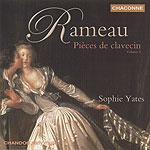Though to a lesser degree, the misgivings expressed in my review of Sophie Yates’ Handel (type Q4994 in Search Reviews) are again evident in her Rameau. Put simply, Yates has a tendency to selectively focus her interpretive prowess on some movements while delivering merely adequate performances of others. With the comparatively less sophisticated keyboard oeuvre of Handel, Yates’ inconsistencies often were excruciatingly apparent. However, with the wealth of ideas and more potential for diversity that Rameau offers, just about any accomplished performer can all but coast through these masterworks and still shine. When Yates’ inspiration beckons (usually in the form of some quirky rhythmic modulation or distended tempo fluctuation) her otherwise mild-mannered interpretation transcends the merely competent. For instance, Yates’ treatments of the inner detail of the opening Allemande and the famous Les Trois Mains of the Suite in A, along with the introduction to the following fifth-movement Fanfarinette, are highly imaginative and fresh. The same can be said of her rendering of the second-movement L’Indifferente of the following Suite in G–though when Yates addresses the notorious fourth-movement La Poule (which presents the performer numerous opportunities to soar), her lack of urgency disappoints. The bottom line is, while overall Yates is never less than good, with so many excellent Rameau cycles currently available–including William Christie’s (Harmonia Mundi) and George Malcolm’s (Decca)–only Yates’ fans are likely to find true value here.
































